If you’re seeking a poultry system focused on animal welfare and sustainability, organic poultry farming may be the right choice for you.
At its core, organic poultry farming emphasizes ecosystem health and the promotion of animal welfare. These characteristics that define organic poultry farming are a huge contrast to conventional poultry farming.

However, transitioning to organic farming represents a significant shift away from intensive poultry systems, even for experienced farmers like you.
In our opinion, organic farming is one the defining features of futuristic poultry farming. In this article we discuss organic poultry farming and the pros and cons involved.
You may also be interested in our comparison of organic vs. conventional poultry farming.
What is organic poultry farming
Organic poultry farming involves raising poultry as naturally and humanly as possible, focusing on two main principles. First, it means allowing birds to roam and graze outdoors. Second, it prioritizes better animal and environmental health.
Because organic poultry farming emphasizes sustainability, it comes with strict regulations regarding flock management, feed sourcing, and byproduct recycling. Specifically:
- Feed must be free from GMOs, pesticides, and fertilizers, and it must be sourced locally.
- Byproducts, such as manure, must be recycled or composted locally.
Overall, organic poultry farming demands more detailed and stringent requirements. We recommend consulting with local certification bodies to understand the specific regulations in your area.
Organic OR pastured
According to Chicken Rising 101 there are at least two types of poultry farming that can be referred to as organic:
- Organic chicken – strictly raised on organic feeds
- Pastured chicken – strictly raised on pastures
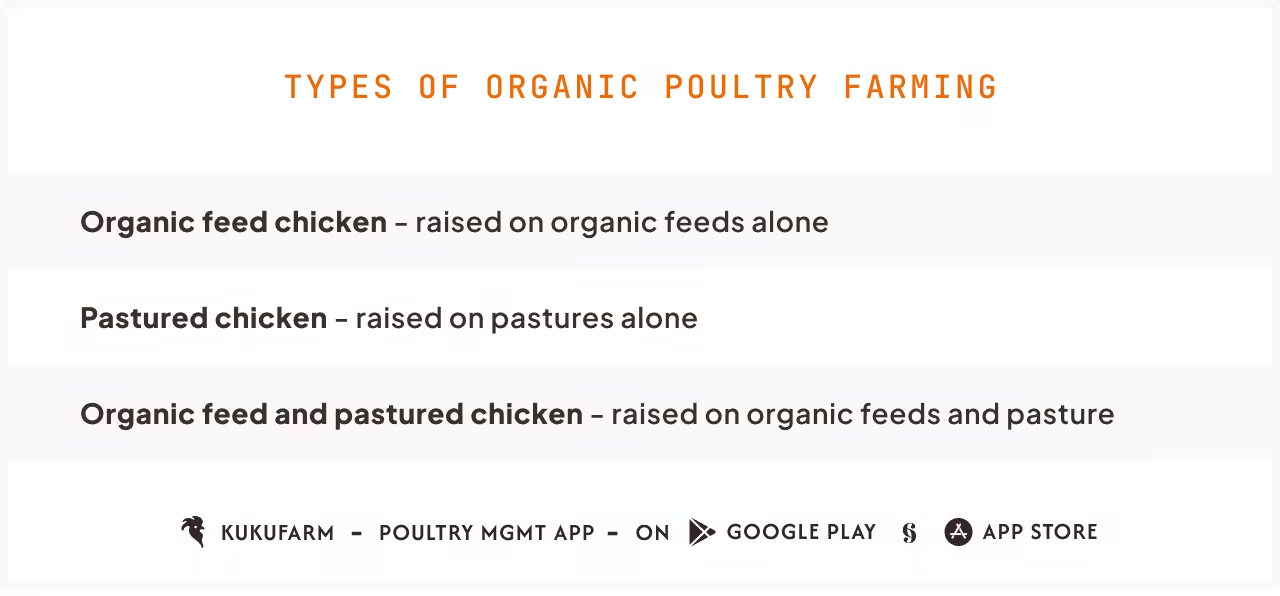
Obviously a flock raised on both organic feeds and pastures also qualifies as organic poultry.
Traits of poultry breeds suitable for organic farming
Needless to say, not all poultry breeds are suitable for organic poultry farming. For instance according to Bosco et. al. breeds with fast growth rates are generally unsuitable.
Although breeds with fast growth rate may outperform slow growth breeds, they are not well suited for walking, grazing and foraging.
Therefore, an ideal breed for organic poultry farming should be hardy, have good disease and thermal tolerance, and a preference to foraging and grazing. Inescapably, chicken with such traits usually have a slow growth rate.
Principles of organic poultry farming
The are a number of basic principles that underline organic poultry farming. According to Bist et. al. and others these can include:
- Provision of outdoor access
- Enabling of natural behaviours
- The use of organic feeds and feed inputs
- Avoidance of GMO-grown feed inputs or growth enhancing agents
- Locally recycling farming byproducts
Organic poultry certification
Due to the novelty of organic farming and respective principles, there are certifications that serve to ensure that you maintain the integrity of organic farming.
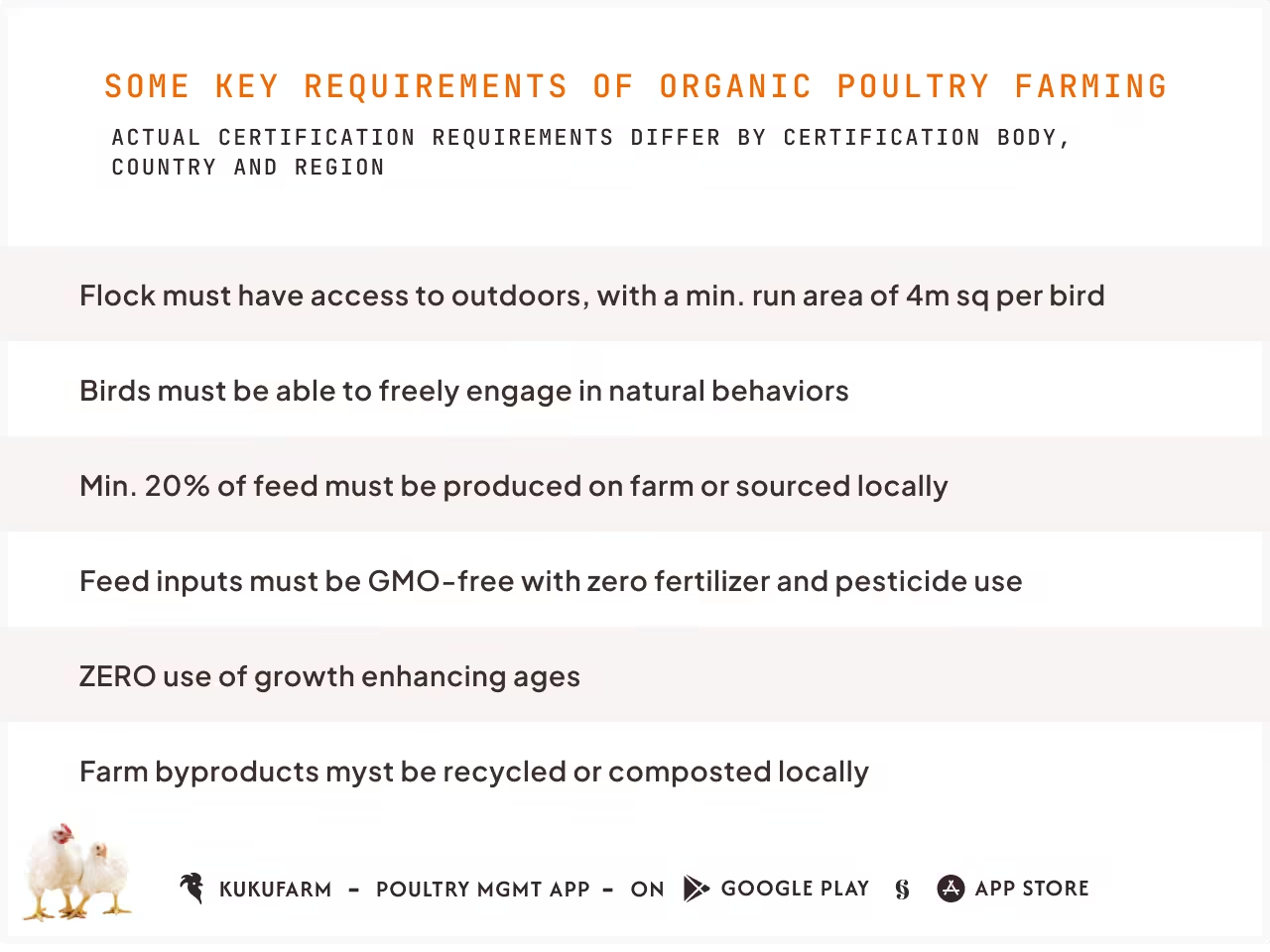
Certification requirements and checks vary by certification body and region or country. However, they are typically stringent and demand thorough documentation of several key aspects, including:
- Feed sourcing
- Farming and flock management methods
- Flock harvesting, produce handling, and packaging
In essence, organic certification upholds the integrity of poultry products. Certified products bear a specific label that not only boosts marketability but also fosters consumer trust.
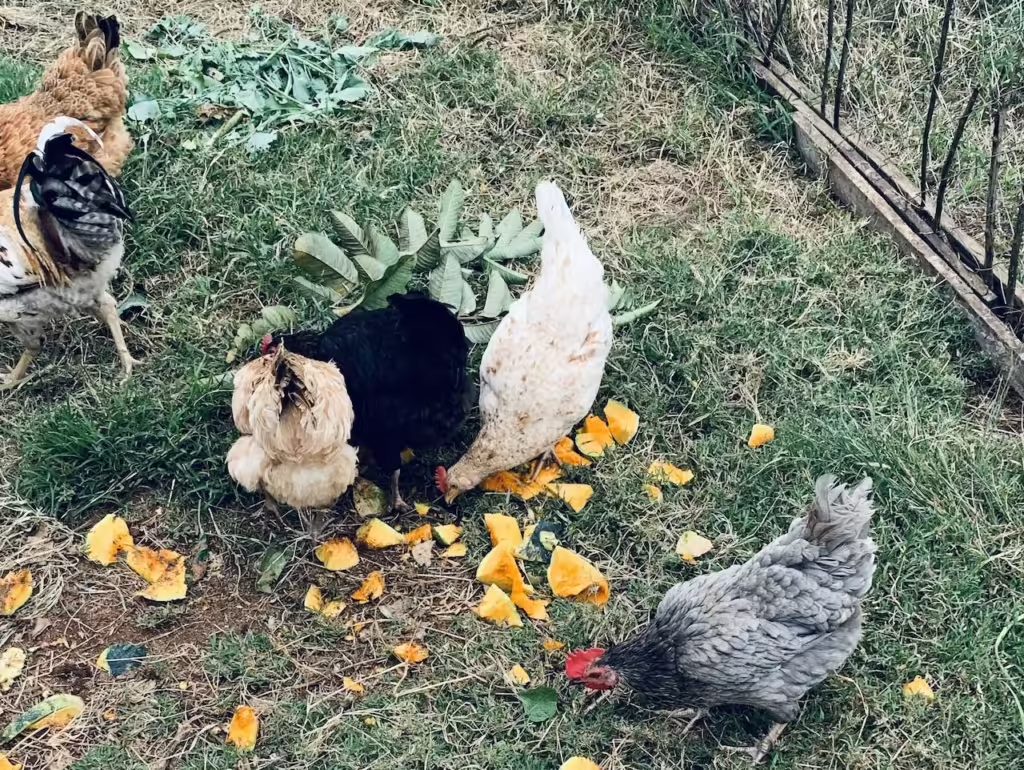
The process of obtaining organic poultry farming certification is undeniably rigorous. It often includes farm inspections and audits conducted by the relevant certification bodies, which can be either government agencies or private organizations.
Pros and cons of organic poultry farming
Pros
Enhanced Animal Nutrition
In organic poultry farming, animals are fed a diet that is free from synthetic additives, GMOs, and harmful chemicals. As a result, this natural approach to feed improves the overall health and nutritional profile of the birds.
By focusing on a balanced, organic diet rich in essential nutrients, poultry in organic systems are healthier and better equipped to thrive, leading to stronger immune systems and better growth rates.
Improved Animal Welfare
In organic poultry farming, animals are given more space to roam and access to outdoor environments, promoting natural behaviors like foraging and dust bathing.

Additionally, the focus on lower stocking densities, reduced use of antibiotics, and a more humane approach to animal care ensures better overall health and well-being for the birds. This approach aligns with growing consumer demand for ethically produced food.
Improved Produce Quality
Organic poultry farming prioritizes natural feed and farming practices, leading to meat and eggs that are often more flavorful and free from harmful chemicals.
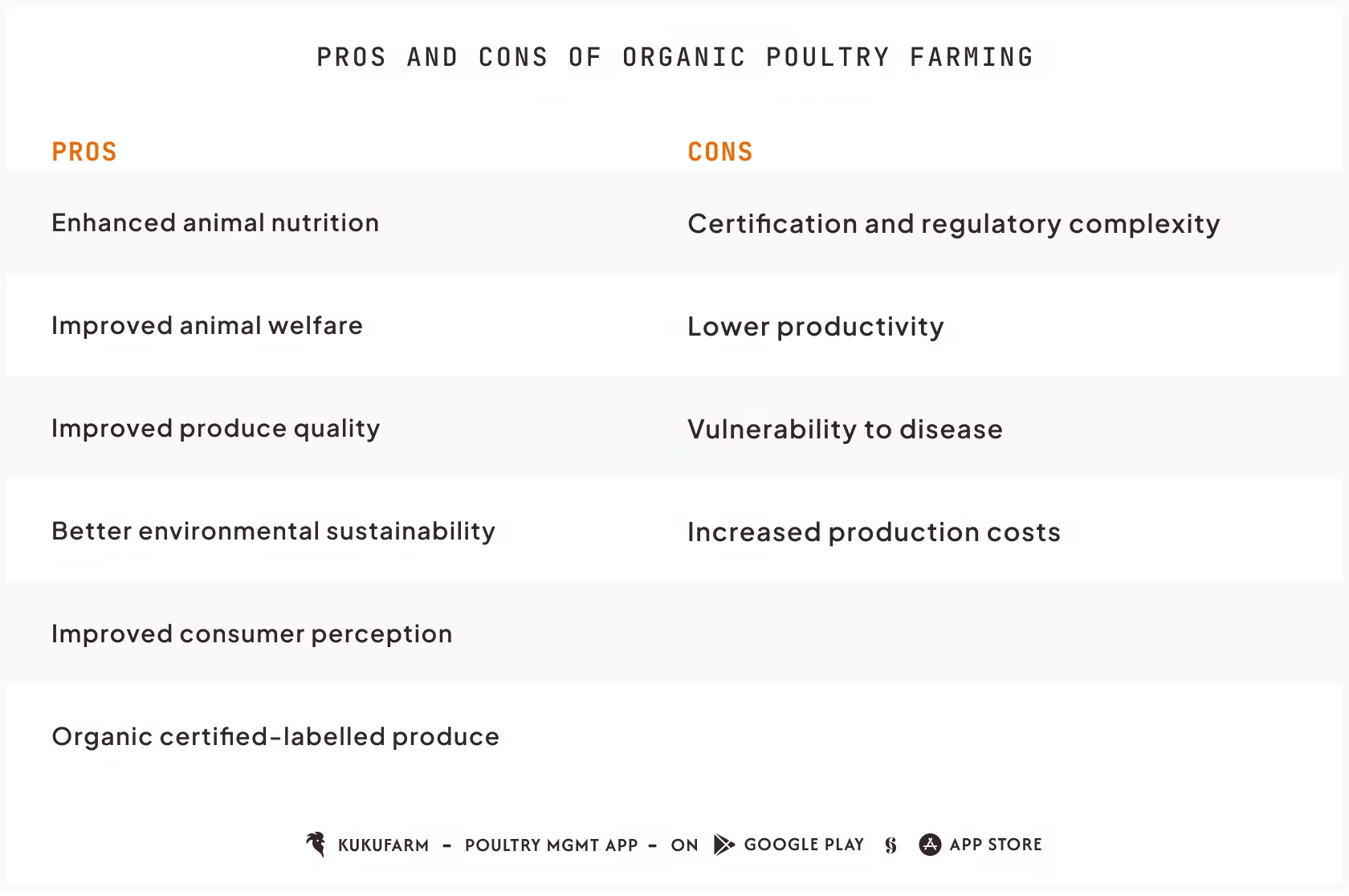
Furthermore, the emphasis on animal health and welfare contributes to higher-quality, nutrient-dense products that are more appealing to health-conscious consumers.
Environmental Sustainability
Organic poultry farming supports sustainability by reducing the use of synthetic chemicals, promoting local feed sourcing, and encouraging practices like composting and recycling byproducts.

These methods help conserve soil health, reduce pollution, and promote biodiversity, making it a more eco-friendly choice compared to conventional poultry farming.
High Consumer Perception
Organic poultry products are viewed positively by consumers who value transparency, ethical production, and sustainability. Importantly, the organic label signals higher quality and a commitment to animal welfare, which enhances consumer trust.
As demand for organic products continues to rise, farmers can benefit from a loyal customer base willing to pay a premium for responsibly produced goods.
Cons
Higher Costs
Organic poultry farming typically involves higher feed and production costs due to the need for certified organic feed, more space per bird, and additional labor for managing animal welfare. These increased expenses can result in higher prices for consumers and reduced profit margins for farmers.
Certification and Regulatory Complexity
The process of obtaining and maintaining organic certification can be time-consuming and complicated, requiring compliance with strict regulations and regular inspections. This can be a barrier for some farmers, especially those new to organic practices.

Lower Productivity
Organic systems often have lower stocking densities and do not rely on antibiotics or growth hormones, which can lead to slower growth rates and lower overall productivity.
The chart below presents a comparison performance and behavior of fast growing and slow growing birds by Bosco et. al. Notably, fast growing breeds achieved had more weight at harvesting time than slow growing breeds. However, the fast growing breed had higher mortality and culling rate.

In both breeds with slow and fast growth rates, there are obvious compromises in productivity; in this case either in time to maturity or in mortality rate.
As a result, this can make it challenging to meet market demand or compete with conventional poultry systems that benefit from more intensive practices.
Vulnerability to Disease
Without the routine use of antibiotics, organic poultry farms may face increased risks of disease outbreaks.
Preventative measures such as proper farm management and biosecurity are critical, but organic systems can be more susceptible to diseases due to the reduced use of chemical interventions.

Our recommendation is to go for breeds that high disease resistance and are hardy in order to minimise disease and culling rates.
Conclusion
In conclusion, organic poultry farming offers a sustainable and ethical alternative to conventional practices, prioritizing animal welfare, ecosystem health, and responsible resource management.
While it requires adherence to strict standards for feed sourcing, flock management, and byproduct recycling, the benefits—both for the environment and consumer trust—are clear.

For farmers considering this transition, it’s essential to consult with local certification bodies to ensure compliance with regional requirements. By choosing organic poultry farming, you not only contribute to a healthier planet but also tap into a growing market that values transparency and sustainability.
*
For your interest, we’ve also done some comparisons of different poultry system:
- Which poultry system is better for poultry health and welfare?
- Deep litter vs. slatted floor
- Free range vs. Deep litter
- Deep litter vs caged poultry systems
- Cage systems vs. aviary
- Deep litter vs Aviary poultry systems
- Cage vs slatted floor poultry systems
- Free range vs caged poultry systems
- Cages vs aviary systems
- Extensive VS Intensive poultry systems
- Intensive poultry systems compared
